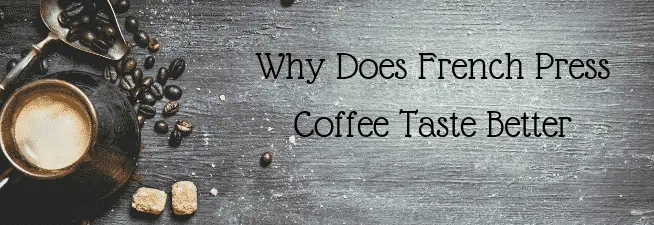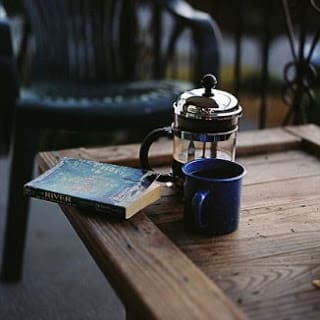
Coffee aficionados agree, the French Press is one of the best ways to brew a delicious cup of coffee.
But why is that?
Here are a Few of the Main Reasons That People Think French Coffee Tastes The Best
- Grind
- Freshness
- Texture
- Brewing
- Ritual
These are just a few of the main reasons I think. Let’s look at each individually.
The Grind
Generally, a French Press requires a coarse or medium-coarse grind coffee to avoid particles in the cup.
The size of your grind will depend on the size of the mesh strainer in your French Press.
Grind size can be adjusted to change the flavor profile of the coffee.
Finer grinds can offer more access to unlocking flavors, but they also over-extract quickly and require additional filtering.
Coarser grinds can reduce the bitterness caused by over-extraction and allow for fuller flavor development.
Freshness
Freshly ground coffee is a big part of the reason French Press coffee tastes so much better than other kinds.
When your beans are freshly ground , the oils from the coffee bean are contained inside until just before you are ready to brew.
This is a stark contrast to pre-ground beans than have been left on the shelf, oils oxidizing and freshness fading away.
Using fresh beans and a burr grinder for optimal consistency in the grinding process, a much more flavorful brew is achieved.
A blade grinder is a better choice than pre-ground beans, but the grind will be inconsistent compared to a burr grinder. This option is more economical, however.
Texture
Another significant reason people enjoy French Press coffee and hail it over other styles of brewing is due to the coffee particles left behind from the brewing process.
These particles add a bolder, more full-bodied flavor profile to the coffee, giving it that punch most people enjoy about French Press coffee.
These particles cut down on the acidity of the coffee providing a more pleasant experience for the drinker.
Related – I prefer using a large French Press because it gives me better taste due to it’s more consitent temperature. If I need to take something to-go though there are a few excellent French press travel mugs that work well too.
The Brewing Process
Attention is paid to the timing of a brew in the French Press, which can also contribute heavily to the superior flavor achieved.
A percolator or single cup coffee machine does not allow for the coffee to be immersed in hot water. The water filters through the coffee quickly, picking up some flavor notes and leaving others, that require time to develop, behind.
A significant loss of flavor that comes with the percolator style of brewing is the loss of oils to the filter paper.
Especially with a freshly ground coffee you want to retain those oils, so you can enjoy the full flavor and freshness of the coffee.
And that brings us to a relevant question that I get from time to time:
Do Coffee Oils Have a Taste on Their Own?
If you’ve ever looked inside a frequently-used coffee grinder or simply noticed something shimmery in your coffee, you’ve probably wondered what causes this greasiness and how it might affect the flavor of your coffee.
Here, we’ll go over what coffee oils are, factors that influence their levels in coffee, and what effects they have on how your coffee tastes.
What Are Coffee Oils, and Where Do They Come From?
Essentially, the oils found in coffee that are present in your french press brew are the result of the caramelization stage of the roasting process.
In this roasting stage, the intense heat will develop a flavor compound known as coffoel. This, in other words, is the oil that you see coating the insides of coffee containers and equipment, as well as that shiny stuff floating in your coffee (source).
Does Coffoel Have a Taste?
In short: most definitely!
If you noticed in the last section, we referred to coffoel as a “flavor compound.” In fact, it’s coffoel’s role in coffee chemistry that makes it so important to store you coffee sealed tightly and away from other strong aromas and flavors. This is because coffoel tends to absorb other flavors quickly and easily (source).
Are Oilier Coffee Beans More Flavorful?
It’s true: the oilier the coffee beans, the more intensely flavorful the resulting brew. This is due to the length of roasting. For instance, darker roasts go through a much longer roasting process. That’s why darker roasted beans will always have a much shinier and oilier surface.
Further, just as longer roasting times lead to darker, oilier coffee beans, it also leads to more sugar burn off. This is why darker roasts are significantly more bitter than lighter roasts.
Pro Tip: You can gauge the freshness of dark roasted beans based on their surface oils! If you have dark roasted beans that are relatively dry, you can be fairly certain that they have gone bad..
Are Coffee Oils Bad for Your Health?
Yes and no. While there are certainly many health benefits to drinking coffee, there are some downsides as well. Some research suggests that coffoel could be responsible for elevated cholesterol levels, but the jury is still out.
As with anything good in life, coffee is best consumed in moderation, if you can help it. Sometimes we can; sometimes we can’t.
The Ritual of Using a French Press is Part of the Appeal!
Perhaps some part of the reason the cup of French Press coffee tastes so much better has a bit to do with the small ritual we perform along with it on top of the actual coffee and oils that are so obvious.
Taking a few moments out of your hectic morning, or day to care for yourself and make a special cup of coffee can be meaningful self-care.
When we get involved in the process of making something, we become that more attached with it.
It may be that our cup of French Press coffee tastes just that much better knowing that we’ve put a little extra love, time, and care into not only making it … but making it exceptional.
Of course there are also some simple ways to make it taste even better so let’s look briefly at the most important one, minimizing the amount of sediment that isn’t filtered out when you press the plunger down.
Reducing French Press Sediment Will Make it Taste Even Better
Many people have a hard time brewing quality French press coffee the first few times they try, despite the relatively simply brewing process.
The biggest complaint new French press users have is that their brews tend to include a lot of sediment, creating a cloudier and less smooth cup than desired.
How to Reduce Sediment in Your French Press Coffee
Lets go over some tips and tricks to limit the amount of sediment in your French press coffee and get you the smooth cup you’re after, without sacrificing any strength or flavor.
1. Perfect Your Grind
One of the biggest mistakes people make when brewing French press coffee is using the wrong size coffee grounds. Since the French press uses a mesh filter to push the grounds to the bottom of the carafe, it’s imperative that you use a rather coarse grind. The grounds must be coarse enough that they won’t pass through the filter.
This is also why it’s important to use a quality burr grinder over a blade grinder, as burr grinders produce a much more uniform grind. Uniformity is key to preventing ‘fines’ (small coffee particles) from passing through the filter.
2. Settle Down!
You’ll notice that these fines tend to float on top of the liquid after you’ve plunged the large grounds down to the bottom. But if you have a bit of patience, you can wait for these fines to settle toward the bottom of the carafe, leaving you with a much smoother, clearer cup when you pour.
3. Strain Again
Finally, if you don’t have the patience to wait for the sediment to settle at the bottom, you can always pour your freshly brewed French press coffee through a second strainer. If you have a fine mesh strainer, you can hold it over your cup and pour the coffee right through it. Just be sure to pour carefully to give the coffee enough time to filter through, or you risk overflowing the strainer.
Does A French Press Make The Best Coffee?
 I sure think it makes the best coffee but it doesn’t offer a lot of versatility in the specialty drink dept.
I sure think it makes the best coffee but it doesn’t offer a lot of versatility in the specialty drink dept.
Depending on your level of sophistication you can make a really great coffee that is either strong or weak or anything in between with a french press.
You can easily play with brewing times to optimize your preferred level of flavor extraction and you can even switch up the brewing temperature if you find certain temps just don’t produce the flavor you’d like.
In fact Howard Schultz, president of Starbucks back in 2012 was quoted as saying his Bodum french press made “the best cup of coffee known to mankind”.
This made headlines seeing as though Starbucks is a leader in coffee but doesn’t even serve french press coffee to their customers!
Now, having said that french press coffee is amazing but you can’t use the coffee produced to make any drinks featuring espresso. The coffee is simply not potent enough.
Personally I use a french press about 50% of the time and a stovetop espresso maker the other 50% of the time.
Once in a blue moon I’ll use my drip coffee maker but these days that is infrequent to say the least. I haven’t used the drip coffee maker since I did that video demonstrating the proper way to clean a coffee maker.
Stovetop espresso is not true espresso but it’s darned close and its the easiest way to get a good “shot” for non-pros. In fact many people that own $1,000 espresso machines still have trouble making shots as good as I get out of my super cheap Bialetti because many fancy machines take talent and skill to operate.
Long story short, if you drink basic coffee and don’t care about latte’s and the gambit of drinks based on espresso then a french press coffee maker is the way to get the best coffee possible.
There’s not a ton of differences in french press pots either. Outside of insulation and size the main difference between pots is style and build quality. You can see our French Press store to see some of the many of the most popular french press coffee makers sold today.
Having though about this post for a while now though I’ve done even more research…
Does A French Press Make The Best Coffee?
Coffee lovers know that there are 101 things that make a good cup of coffee. Well, 101 may be too much. The point is, you need effort to make one cup of good coffee. The major requirements to make a good cup of coffee include good beans, roast, grind and water temperature. For espresso shot, you need to add a key element – pressure.
Coffee shops and gourmet cafes go through lengths to perfect the art of brewing coffee. It’s make or break. One wrong move in the brewing process can change the taste of coffee dramatically. It is also during the brewing process when specialty coffee shops inject their best-kept secret to make their signature coffee concoction.
While we love visiting coffee shops and reciting our favorite cup of coffee to our friendly barista, there’s something really ethereal with brewing your own coffee at home. There’s something magical, romantic and even practical with the idea of making your own cup.
This is the reason why several coffee makers, brewers and all sorts of kitchen equipment that help you brew coffee at home with ease. One of the most popular choices is the French press.
Reasons why a French Press can Make the Best Coffee
Lifehack shared six reasons why French press can make the best coffee. It’s worth looking into and if you have been using a drip machine for a long time and shifted to French press, you will really notice the difference.
- French press retains the flavor and aroma that coffee is known for. Paper filters used in almost all coffee makers take out the flavor and oils. Just like in any good food, the fats and oils hold the flavor and when heated, the flavors burst out. French press allows you to enjoy the flavor and the tiny coffee ground that goes into your cup adds to the great tasting coffee up to the last drop.
- French press allows steeping. Just like with any good tea, to get the full body flavor, taste and aroma of coffee, allow it to steep for up to 4 minutes. Steeping allows water to penetrate the cells of the coffee grounds and get it ready for extracting the coffee when pressed.
- French press gives you a full cup. Everything is in the cup. All the flavors and aroma are extracted to make one of the best homemade coffee.
- French press saturates all the coffee grounds. Unlike with a drip machine or percolator, the hot water just passes through the coffee grounds. With the steeping process of the French press, you know that all coffee grounds are penetrated with water. When you add the pressure of the plunger, you extract real coffee goodness.
- French press can help you make espresso. With the right coffee roast and grind, you can recreate your own espresso at home. If you love espresso to the moon, you’ll love owning a French press at home.
- Use a coarse grinder. The French press uses a mesh wire to separate the liquid from the coffee beans. To get a better coffee and more flavorful cup, ensure that you use a coarse grinder. If you are getting ground coffee from a store, tell the barista to make it coarse ground.
- Exert a steady pressure. When pushing the plunger down, exert a steady pressure all the way down. Others suggest that you push the plunger halfway down to remove any air inside. Then pull up the plunger and push down with one steady stroke.
- Requires no pouring skills.
- Allows precise control over steeping time.
- Brews up to eight cups at a time.
- No filters needed.
- Produces a good cup of coffee.
- Grounds and coffee sludge can end up in your cup.
- Cleaning up is messy.
- Bodum CHAMBORD French Press Coffee Maker – Special features: Can make up to 12-ounces of coffee. Has a heat-resistant borosilicate glass carafe with a plastic handle and base. Easy to clean.
- Bodum BRAZIL Coffee Maker – Special features: Can make up to 34-ounces of coffee. Perfect for a small family. Affordable French press model. All parts are dishwasher safe.
- Frieling Double Wall Stainless Steel French Press Coffee Maker – Special features: Sleek design with full stainless steel body. Insulated carafe, perfect for serving coffee at the table for breakfast, snack or when having a coffee party at home. Full length handle to avoid slipping. All parts are dishwasher safe.
- KONA French Press Coffee Maker – Special features: Very durable, perfect for busy family that fears glass and any breakable items. Has 12-ounce and 34-ounce models. All parts are dishwasher safe.
- Le Creuset of America Stoneware Petite French Press – Special features: Has a nice heft and maintains temperature, so it’s ideal for keeping your coffee warm. It’s also safe for use in the freezer, microwave, oven, and dishwasher, so the carafe can be used for much more than coffee.
To ensure that you make the best coffee using a French press, you need to remember two things:
French Press Pros and Cons
French press is undoubtedly a good addition to your kitchen equipment if you love making great coffee at home. But it has its fair share of pros and cons.
Pros:
Cons:
Best French Press Brands/Models
If you are shopping the market for a new French press, Spruce Eats recommend the following models and brands. Go check it out.
